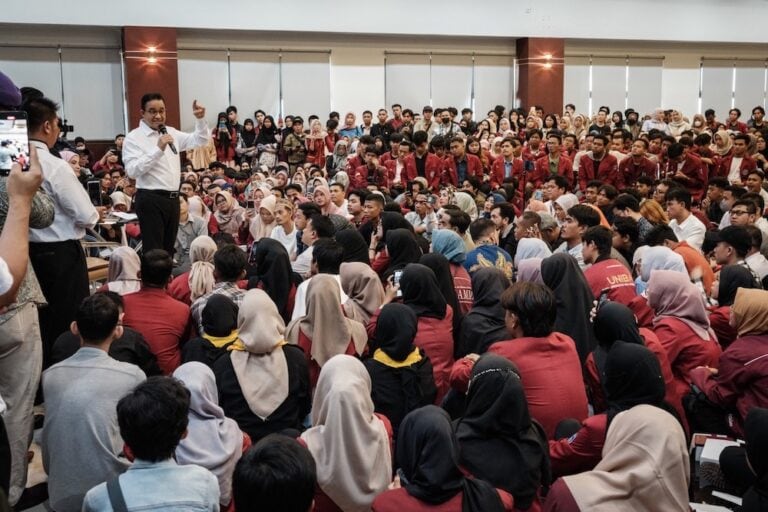AJI noted that there were many criminal defamation cases filed against Internet users in 2009.
(AJI/IFEX) – Jakarta, 29 December 2009 – Advances in information technology have brought about a major transformation of the press industry and the way that people express their opinion and feelings. This is marked by the growth of news websites, blogs and online social networks. Social networks have become alternative communication channels for people and therefore the number of users accessing these sites have mushroomed.
However, virtual reality is no longer the freest media as it is under attack by non-democratic laws. Throughout 2009, there were a number of criminal defamation cases against Internet users in Indonesia:
1. Ujang Romansyah, a student from Bogor for updating his status on Facebook on June 30 2009. Ujang was charged with defamation by Felly, fellow Facebookers for a message posted on his Facebook wall.
2. Muhammad Iqbal, a temporary employee at the Lampung Office of Forestry, was reported by secretary Veronica Bertha to the police on 2 July 2009 for a message he posted on Facebook. Iqbal had sent a message to another temporary employee in the same office, Belinda.
3. Imbar Ismail, a member of the South Sulawesi local parliament, was reported to the police on 23 September 2009 because he sent a message to Bandung-based dentist Dewi Riasari Zainuddin’s inbox in Facebook. Words used in his message were deemed defamatory.
4. Luna Maya, a celebrity, was reported by workers from an entertainment programme on 15 December 2009. She was charged with defamation for her comments posted on Twitter.com.
The number of Internet defamation cases doubled in 2009. In 2008, there were only 2 cases – blogger Nurliswandi Pilliang faced charges filed by member of parliament Alvin Lie and Prita Mulyasari was charged by the Omni International Hospital Alam Sutera Tangerang.
Repressive Regulations
Press freedom and freedom of expression in Indonesia is restricted by undemocratic legislation. Criminal defamation charges are used to repress critical voices. They are stipulated in the Indonesian Penal Code and the Electronic Transaction and Information Law No 11/2008.
The Indonesian Penal Code refers to defamation of heads of States (Article 142 to 144), of public officials (Article 207 and 208), and individuals (Article 310 to 322).
Defamation through the media is stipulated in Article 27, point (3) of the Electronic Transaction and Information Law No 11/2008, which states that anyone distributing and/or transmitting and/or providing access to defamatory electronic documents and/or information, with or without any intention (. . .) will face 6 years in prison.
Article 27 point (3) is much more repressive compared to the Indonesian Penal Code, in terms of sanctions and the terminology used. Anyone committing defamation through the electronic media faces 6 years in prison. According to the Indonesian Penal Code, the maximum criminal sanction for defamation is “only” 1 year and four months.
Moreover, Article 27 point (3) does not require defamation to be committed in public. Defamation through private communication channels is also sanctioned. Under the Indonesian Penal Code, defamation is punishable by law only if it is committed in public.
Moreover, Article 27 point (3) does not limit the target of defamation to individuals or lawful institutions – as stipulated in the Indonesian Penal Code. Therefore, individuals can be charged with defamation of a “non-living object” under this article.
As a result, Article 27 point (3) is deemed elusive. This is a violation of a basic legal principle calling for clear and specific definitions.
Moreover, sentences of 6 years in prison are discriminatory towards online journalists and internet users. This is because those committing defamation through the conventional media face “only” 1 year and 4 months of imprisonment. This is another violation of the principle of justice – imposing different sanctions on similar actions.
Besides Article 27 point (3), Article 28 point (1) also stipulates a sanction of 6 years in prison for the distribution of false information on the Internet. This is much more repressive compared to the libel legislation, as stipulated in Article 311 KUHP which stipulates 4 years in prison.
AJI Indonesia filed a request calling for an examination of Article 27 point (3) but this was dismissed by the Constitutional Court. Therefore AJI Indonesia is calling on the House of Representatives to revise the law.
Violence against Journalists
Throughout 2009, Indonesian journalists also faced threats of violence. In 2009, there were 40 incidents of journalists being targeted, comprising of murder (1 case), assault (20 cases), obstruction of reporting (4 cases), lawsuits (7 cases), hostage taking (2 cases), intimidation (1 case), demonstration (2 cases) and censorship (2 cases).
Compared to 2008, the number of incidents of violence against journalists dropped. According to AJI Indonesia, in 2008 there were 60 cases of journalists being targeted comprising of assault (21 cases), intimidation (19 cases), obstruction of reporting (9 cases), lawsuits (6 cases), censorship (3 cases), and demonstration (2 cases).


